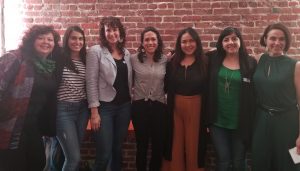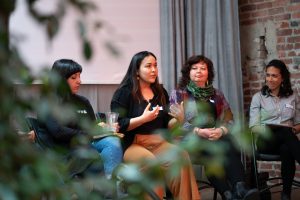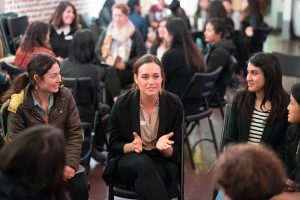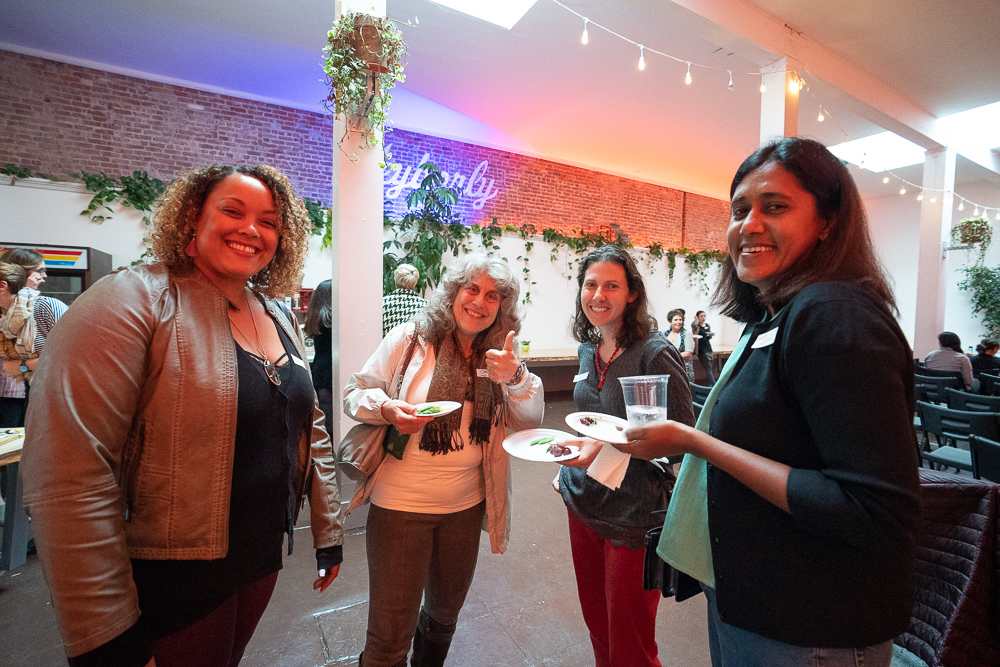A Report-Back from WEN’s Environmental Changemakers Story Salon
By Sandra Lupien, WEN Board Member
So often I find words unable to capture the richest experiences—the delight of watching a pair of fawns play with their mothers in a dewy Sierra meadow; the subtle sense of empowerment I gain from solo travel; the warmth contained in a hug shared with a really good friend. Rather, these experiences work inside me, shaping and supporting me in ways I know are meaningful, important—transformational, sometimes—but cannot be articulated.
The same is true of WEN’s Women’s History Month event, “Past. Present. Future. Women’s Environmental Changemakers Story Salon.” Although the evening was rich with them, I struggle to find the right words to convey the powerful energy, respect, care, and solidarity that connected more than fifty women who gathered at Neyborly Poet’s Corner on March 26 to share inspiring stories and engaged conversation. And so, I “pass the mic” (more on this later) to our five featured storytellers—who so poignantly set the tone and opened the space for the evening by sharing their path to environmental careers, the change they’re making now, and their visions for the future—to communicate the event’s uniqueness and impact.

Ellie Tumbuan, Ruby Tumber (Facilitator/WEN Board Member), Arielle Moinester, Purba Mukerjee, Liz Solorio, Nahal Ghoghaie, Sandra Lupien (WEN Board Member)
“Wow,” wrote Arielle Moinester of Women’s Environmental Alliance in a post-event email thread. “This event was so connected and generative, beyond what I imagined and beyond any event in which I’ve participated in a long time! I am still vibrating with the inspiration and learning I received from every woman in the room!”
Nahal Ghoghaie of Environmental Justice Coalition for Water and EcoLegacy Consulting chimed in that she found the event, “Very stimulating yet therapeutic,” and “I am so-so grateful to have shared such an inspiring evening with you all.”
“How uplifting and empowering to be surrounded by so many incredible women!” wrote UC Berkeley Environmental Law Clinic Teaching Fellow, Purba Mukerjee. “Loved learning from all of you and from all of the amazing attendees.”
Liz Solorio of Food & Water Watch shared, “I’m still feeling so energized and inspired by everyone’s stories, passion and spirit. I haven’t felt that energy in a long time. I hope we’ll all continue these conversations.”
“I’m so humbled by all of your work and personal stories, all of you,” wrote Ellie Tumbuan of The Justice Collective. “Let’s lift each other up always.”
Clearly, we shared a special evening burgeoning with deep insights—here are a few takeaways:

Liz Solorio shares her story. Photo credit: Alison Brown
The Origins of Our Environmental Paths are Often Deeply Personal
Liz and Purba, both women of color, learned about how structural racism directly affected their lives through elementary school projects. Purba’s science project compared air quality in her family’s industrial neighborhood to that in her best friend’s affluent one, so the connection to environment was immediate–but she only realized the link between that experience and her career path much later. For Liz, the environmental connection came later when her dad, an immigrant from Mexico explained to her that industrial agriculture was wiping out their indigenous foods, and she knew right away she had to fight back.
But Those Paths Don’t Always Go Where We Think They Will
Arielle began her career in architecture, where she became exposed to anti-poverty policy related to housing. Working on poverty exposed her to child nutrition issues, which led to her interest in agriculture and the Farm Bill; she realized starvation and inadequate nutrition are not problems of quantity; rather they’re problems of distribution and policy—and women are a key solving them.
And That’s OK, Because Working Across Issues is Key

Photo credit: Alison Brown
Taking a winding road, rather than a straight one, can provide a more holistic perspective—one that is increasingly valued in changemaking work, which relies on seeing the connections among issues and building bridges through partnerships and coalitions. As one attendee said: “This intersectionality is so encouraging. We’re seeing younger changemakers working across issues—gun control, environment, teacher’s strikes, racial equity. This upsurge of action is encouraging for older generations who’ve tended to work more in silos.”
Pass the Mic
Each featured storyteller talked of the importance of centering communities that are most affected by environmental and climate impacts. By understanding their priorities and culture, we can provide the right tools and support to help communities amplify their voices and achieve victories that protect and promote their health, safety, and quality of life. Nahal referred to herself as a conduit and connector—of communities to each other, to resources, to training. Purba spoke of her former role as a toxicologist providing expertise and information to support informed community action, but emphasized that it’s not the toxicologist’s role to speak for the community. Ellie referred to this concept as “passing the mic,” and of her need, as a multi-racial woman who sometimes has “white-passing privilege,” to carefully evaluate “when can I be an ally, and when should I tell the story?”
Women Are Powerful—Especially When We Stand Together
As Arielle put it, “When women thrive, the earth thrives. We can’t afford to burn out. We need each other to be able to do this work.”
Ellie concurred: “When women support each other, anything is possible.”
The Final Word
At the end of this spectacularly inspiring evening, I found myself at a loss for words to characterize the feeling in the room. I was so grateful when Carole—for whom the Story Salon was her first WEN event—stood and declared, “I’ve found my tribe!”
Indeed.

Photo credit: Alison Brown
